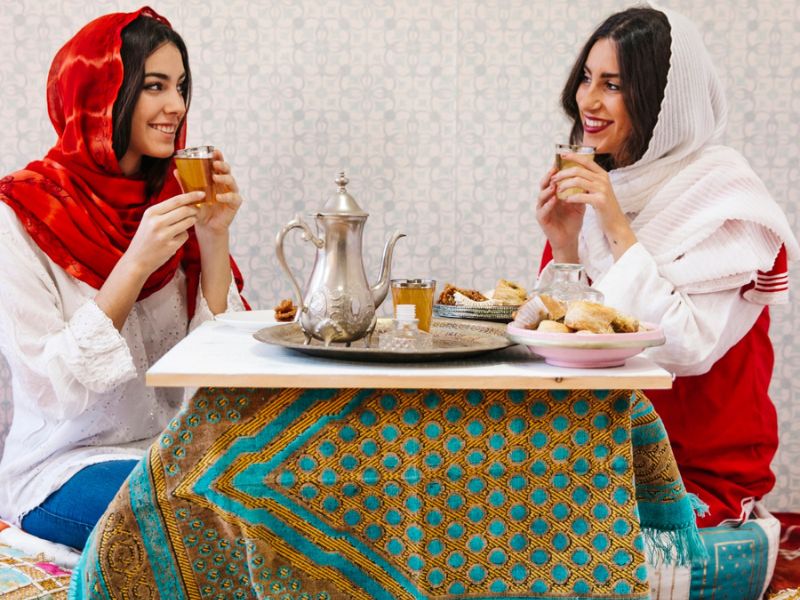Ramadan is a special month for Muslims all over the world. It’s the time when they believe the Quran was given to the Prophet Muhammad.
During this month, Muslims fast from sunrise to sunset, which means they don’t eat or drink anything. But Ramadan is more than skipping meals; it’s about becoming a better person, feeling closer to Allah and helping others. People also pray more and read the Quran. The fasting ends with a big celebration called Eid al-Fitr, where everyone enjoys food, gives gifts and spends time with family and friends. It’s a month of kindness, prayer, and community.
Incorporating Ramadan in the workplace and gaining an understanding of this holy month can significantly enhance inclusivity and respect among colleagues. Ramadan, a period of fasting, reflection and community for Muslims, offers a unique opportunity for workplaces to foster a supportive environment. By adjusting work schedules, providing spaces for prayer and recognising the importance of Iftar, employers can accommodate the needs of Muslim employees. This guide aims to enlighten and equip workplaces with the knowledge and tools to embrace the practices of Ramadan, promoting a culture of empathy and inclusivity that extends beyond just one month.
Here’s a simple guide to understanding it:
What is Ramadan? Ramadan is a holy month for Muslims, marking the time when the Quran was revealed to Prophet Muhammad. It’s a period of fasting, reflection, prayer and community.
Fasting: During Ramadan, Muslims fast from dawn until sunset. This means no eating, drinking, smoking or sinful behaviour during daylight hours. It’s a way to practice self-discipline and get closer to Allah.
The purpose: Fasting is not just about physical restraint; it’s also a time for spiritual growth, increased charity and deepening community ties. It’s a moment to purify the soul and focus on good deeds.
Suhoor and Iftar: Suhoor is the meal eaten before dawn and iftar is the meal to break the fast at sunset. These meals are often shared with family and friends.
Prayer and Quran: Muslims pray more during Ramadan and spend time reading the Quran. It’s a way to connect with Allah and the teachings of Islam.
Eid al-Fitr: Ramadan ends with the celebration of Eid al-Fitr. It’s a festive day of joy, where Muslims pray, exchange gifts and enjoy meals with loved ones. It’s also a time to give charity to those in need.
Everyone’s experience is different: While fasting is important, not everyone can fast due to health reasons and that’s okay. Islam allows exceptions for the sick, elderly, pregnant and those travelling.
A time for patience and charity: Beyond fasting, Ramadan is a time to help others, show kindness and do good deeds. It’s about community spirit and caring for those less fortunate.
Including Ramadan in the workplace can foster a culture of inclusivity and respect. Here are some tips on how to do it:
Education and awareness: Provide information or hold a brief session about what Ramadan is and what it involves. Understanding fosters respect among all employees.
Flexible working hours: Consider offering flexible working hours or the option to work from home for those observing Ramadan. Fasting can be physically taxing and adjustments can help maintain productivity.
Quiet spaces: Provide a quiet space for prayer and reflection. This can be beneficial not just for Muslim employees but for anyone who seeks a moment of quiet during the workday.
Adjust meeting times: Try to schedule meetings outside of fasting hours, especially ones that involve food or drinks. This consideration ensures everyone can fully participate.
Support for break-fast: Encourage and support Iftar gatherings, either within the workplace or by allowing time off to break-fast with family. This can also be an opportunity for team bonding if everyone is invited to participate or learn more about the tradition.
Acknowledge Eid: Recognise the end of Ramadan, Eid al-Fitr, as a significant celebration for Muslim employees. Allow them to take time off to celebrate with their families and maybe even mark the occasion within the workplace.

Promote inclusion: Encourage inclusivity and respect for all cultural and religious observances. This approach not only supports those observing Ramadan but also builds a more inclusive workplace culture overall.
By incorporating these practices, workplaces can show support for Muslim employees observing Ramadan, enhancing a culture of understanding, respect and inclusivity.
Ramadan is much more than just not eating and drinking. It’s a profound and enriching experience that touches every aspect of a Muslim’s life, aiming to bring them closer to Allah and to each other.









